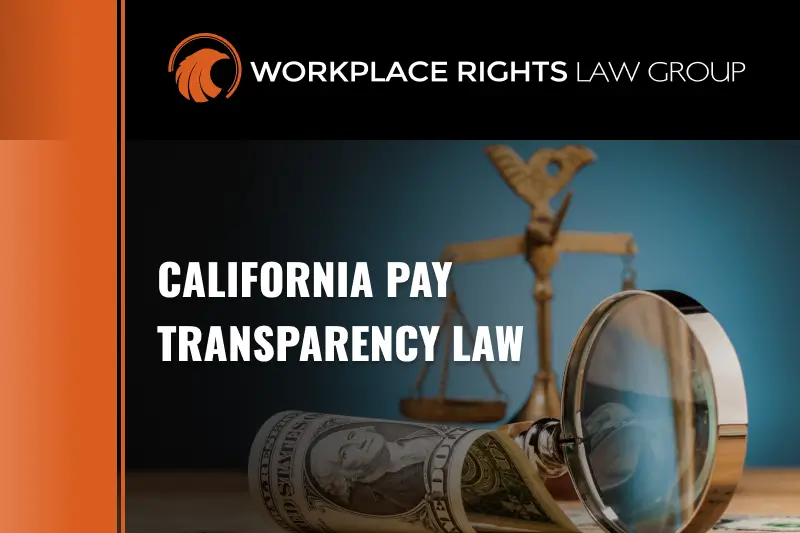
In early 2023, California enacted a new pay transparency law, requiring employers to disclose pay ranges in job postings and imposing new pay data compliance requirements.
While California has been a leader in driving pay equity, Senate Bill (SB) 1162 further expands California’s leadership in moving forward with this vital concept.
Beginning in January 2023, covered employers must comply with new pay data reporting processes and rules surrounding information about employee pay, demographics, and contract workers.
In this post, the Workplace Rights Law Group team will explain SB 1162 reporting requirements and discuss how these new rules compare with existing California pay data laws. We will also tell you more about what this law means for California employees.
What Is the California Pay Transparency Law?
SB 1162, known as the California pay transparency law, enhances existing laws regarding California pay data reporting.
This new law requires employers with 15 or more employees to include a pay scale for job postings.
This requirement applies to internal and external job postings, including those through third-party recruiters and agencies.
SB 1162 also strengthens pay data reporting by imposing new transparency requirements for employers with 100 or more employees.
Finally, a new employer obligation under SB 1162 mandates that employers report pay data not only for their full and part-time employees but for temporary workers or workers employed through a third-party labor contractor.
What Does SB 1162 Require?
Since January 2023, California’s SB 1162 has required that employers with 15 or more workers disclose salary ranges in internal, external, and third-party job postings.
Those who employ more than 100 workers, including their contract workforce, must provide periodic reports on mean and median wage data.
Two things to note about SB 1162’s reporting requirements include:
- Mandatory pay data reporting requirements cover the reporting of base pay only, not equity, bonuses, or other compensation; and
- Employers must reveal pay scales to employees requesting information about their current role.
Regardless of whether your company’s corporate headquarters is in another state, anyone who employs at least 15 employees in California must comply with this new law.
An employment lawyer in California can help you navigate these new requirements and confirm whether your employer is compliant.
What Are SB 1162’s Reporting Requirements?
SB 1162 increases transparency by requiring employers to keep certain pay data and disclose it to employees and to put the information on file with the state.
Those who employ over 100 people, including full-time employees and contract workers, must provide the California Civil Rights Department (CRD) with their required pay data.
Some key aspects of these reporting requirements include:
- Employers must file a pay data report with the CRD on or before May 10, 2023;
- Employers of more than 100 workers must continue to file pay data reports on the second Wednesday of May for every year thereafter;
- The report must include the median and mean hourly rate for each combination of race, ethnicity, and sex in each job category;
- The report must cover a single workplace or establishment only, without a requirement for consolidated reporting across the employer’s entire business; and
- The report must be made readable and searchable, with Excel and CSV as recommended formats.
Speak with a California employment lawyer today if your employer has not provided appropriate or adequate information.
As a California employee or contract worker, you have a right to your employer’s pay data.
Are There Any SB 1162 California Penalties for Noncompliance?
There are several penalties for SB 1162 noncompliance.
The new law allows the CRD to seek an order compelling a noncompliant employer to provide their pay data report. The CRD may also recover the costs of obtaining such an order.
Regarding financial penalties, the CRD can also request that a court impose civil penalties on a noncompliant employer.
This fine cannot exceed $100 per employee for a first-time violation. Any subsequent failures to submit a report can increase the fine to $200 per employee.
This enhanced enforcement power is an important change under SB 1162. Previously, the CRD could only seek an order to compel a noncompliant employer to file their report.
How Does SB 1162 Differ from Other California Pay Transparency Laws?
California has other fair pay and pay transparency laws that may have impacted you in the past. Here are some of the different laws in California that help guarantee equity and transparency in worker pay.
California Equal Pay Act (CEPA)
The CEPA, amended in 2016, aims to address pay equity issues.
It requires employers to pay employees of one gender the same wage rate as employees of the opposite gender for substantially similar work. CEPA also contains provisions that prohibit employers from retaliating against employees who discuss their wages with each other.
Salary History Ban (AB 168)
The Salary History Ban (AB 168), in effect since 2018, prohibits employers from asking about an applicant’s salary history during the hiring process.
The law promotes pay equity by preventing employers from perpetuating pay disparities based on an individual’s previous salary history.
California Fair Pay Act (CFPA)
The CFPA requires equal pay for substantially similar work regardless of gender.
It mandates that employers provide legitimate reasons for pay differentials, such as education, experience, or merit.
The CFPA encourages transparency in pay decisions by requiring employers to maintain records of wages, job classifications, and other relevant data for three years.
Speak with an Employment Lawyer in California
You have a right to information about your company’s pay practices.
If you find that your employer does not provide you or the state with the required pay transparency data, the Workplace Rights Law Group may be able to help.
We have helped hundreds of California workers obtain the information they need to enforce their workplace rights.
We have also recovered millions of dollars on behalf of mistreated California workers, and we are ready to fight for you. Call us to schedule a consultation.

Where You Can Find Our Glendale Office Location
Where You Can Find Our Riverside Office Location
